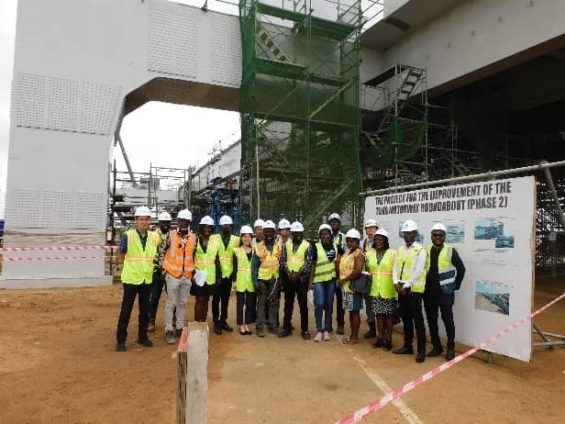A delegation from the Japanese Embassy in Accra and the Japan International Cooperation Agency (JICA) together with journalists from some media organisations in Ghana toured the Tema Interchange (Phase II) and two start-ups helping address critical challenges in the health and transportation sector: Sora Technology and Transonica Company Limited respectively.
At the Tema Motorway Roundabout, the delegation visited “The Project for the Improvement of the Tema Motorway Roundabout Phase II”, which commenced in 2022, following the signing of a JPY 3.65 billion equivalent to 33-million-dollar grant. It is funded by the Government of Japan.
The project will address traffic congestion at the five-legged Tema intersection where traffic from Accra and Tema Port converges during peak hours. It will alleviate traffic congestion and reduce travel time four times the current situation
“In June 2020, the first phase of the project was completed. It covered the construction of an underground tunnel and a midlevel interchange,” Assistant Resident Supervisor on the project, Yaw Tenkorang Osei, explained.

He mentioned that the Phase II of the project includes the construction of a third-tier flyover, which will be a composite bridge structure from the Harbour Road (south side) to Ashaiman (north side) on the N2 stretch of the interchange. According to him, the Phase II will be completed by December, but a part of the interchange will open to traffic in November.
He expressed his gratitude to the Japanese Government for the project and the opportunity that was provided for him and many other Ghanaian engineers and construction professionals to learn and apply latest Japanese technologies such as the use of high quality steel with low maintenance cost and long lifespan.
The delegation visited Sora Technology, a company that employs drones and Artificial Intelligence, AI, in Larval Source Management (LSM). This method eliminates mosquito larvae in water bodies before they mature into adults. Traditional LSM methods involved indiscriminate spraying of insecticides in water bodies through manual labor.
However, SORA Technology has developed a cost-effective and environmentally friendly approach that reduces the need for manpower and insecticide through the use drones and AI.
Sora uses drones to survey targeted areas and identify water bodies where mosquito larvae breed. Its AI algorithms will analyze the data to pinpoint high-risk breeding sites. Insecticides are sprayed only in these high-risk areas, effectively suppressing mosquito populations, reducing the risk of malaria transmission among local populations and saving cost and man hours.
Head of Africa Business at Sora Technology, Mary Yeboah Asantewaa said: “We are able to combine sensors, the environmental viables with the images to tell you that waterbody A has larvae, waterbody B doesn’t have. We call it reclassification. After we classify the waterbody, we transfer it onto our mobile app or database to navigate the sprayer to the high-risk zone.”
Journalists also visited Transonica Company Limited, a business which won second place in the JICA Next Innovation with Japan (NINJA) competition in 2021. Mr. Daniel Kwantwi, CEO of Transonica, was inspired by the use of the cashless system to pay for transport fares in Japan when he was studying at the University of Tokyo.
He was a beneficiary of JICA’s African Business Education Initiative for Youth (ABE) scholarship. Currently, Transonica has introduced a card payment system for bus fare and shopping at the University of Ghana, Legon campus.
Mr. Kwantwi revealed that about 13,000 users are already registered on the company’s platform. He mentioned that there were plans to replicate the platform on other campuses and outlets across Ghana. “We want to reduce the inefficiencies. What we do is that we install our machines inside your buses, and you are able to use that to collect your money. We want to make sure making transactions would not be a hustle. We want to make sure that every Ghanaian, irrespective of class, is able to go cashless,” he explained.
A Senior Representative at JICA, Oda Ryotaro, reiterated the commitment of Japan to fostering sustainable development and technological advancement in the country.
“As JICA continues to invest in these key areas and many others, the collaborative efforts promise to drive sustainable growth and prosperity for the country, building on a legacy of partnership that spans more than six decades in line with Ghana’s overall developmental agenda,” he concluded.
Latest Stories
-
Congo, M23 rebels plan return to Qatar talks amid Trump pressure
3 hours -
US, Colombia recall their ambassadors in diplomatic tussle
3 hours -
‘It’s a joke’: Peruvians outraged after president doubles her salary
3 hours -
Putin tells Trump he won’t back down from goals in Ukraine, Kremlin says
3 hours -
Boxer Julio Cesar Chavez Jr arrested by US immigration
3 hours -
Over 100 former senior officials warn against planned staff cuts at US State Department
4 hours -
Dagbang overlord bans celebration of 2025 fire festival in Tamale
4 hours -
BBC senior staff told to ‘step back’ from duties following row
4 hours -
North Tongu DCE urges trust in gov’t as flood victims awaits compensation
4 hours -
2 arrested for murder of Lebanese national in East Legon
4 hours -
NSMQ 2025: GSTS clinch Western Regional Championship to book spot at national
4 hours -
New Supreme Court judges pledge fairness, acknowledge family support
4 hours -
Kilmar Ábrego García alleges torture and abuse in El Salvador prison
4 hours -
Gov’t sets up committee to investigate sale of state lands, including those owned by schools
4 hours -
Angélique Kidjo first black African to get Hollywood Walk of Fame star
4 hours

